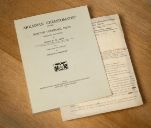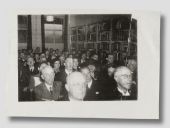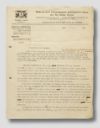A hero beyond a shadow of a doubt
On the night of April 14, 1945, 5,000 women from camp Buchenwald were forced onto the road in single file. Escorted by SS agents, the prisoners had to travel enormous distances by foot. The hardships they had to endure were inhuman. Nine young women managed to escape together. What followed was a dangerous journey through enemy territory, in search of the advancing US army. One of these women was resistance fighter Madelon Verstijnen, student of Arabic and Assyrian languages and associated with the NINO as an academic assistant.
Madelon Verstijnen: The men went first, so they were already completely exhausted. There were buches of them on the side of the road, dying. And then getting kicked down with a rifle butt. Sure …
This is Madelon Verstijnen. She was Professor Böhl’s only student during the war.
Herman: Yes, Madelon Verstijnen was a very nice lady , the only student my father ever taught how to read cuneiform, and she lived in a room upstairs in the NINO.
This is Herman Böhl again, son of Professor Böhl.
Herman: She was taken prisoner in Paris, where she went looking for her brother, because she was part of the resistance.
The story of the NINO during the Second World War is not one of pronounced heroes and traitors, at least not as far as we know. But though she would never describe them as such, Madelon’s actions are that of a hero, beyond a shadow of a doubt.
Madelon Verstijnen: Everyone around us was dying. And we talked about why we wanted to stay alive. If I die now, or tomorrow, no one would care, well, my parents, sure, and my family and my friends. And I wouldn’t have left a mark on this world. Not even a child. And so everyone had their own reasons for why they absolutely wanted to stay alive.
In 1944, Madelon Verstijnen left Leiden to go after her brother Eric, to join the resistance in Paris. Shortly after her arrival in a Parisian hotel, she is betrayed, together with other members of the resistance. The entire network is rounded up.
Madelon Verstijnen: With the exception of those who happened to be eating a sandwich on the other side of the street, or something, who just happened to be out of the hotel at that exact moment or were somewhere else… Polizei! Aufmachen! Kicking, obviously, kicking in the doors. This was it. It was true. Betrayed!
Madelon ends up in Buchenwald. Every morning she stands for roll-call, together with thousands of other women. Hours and hours of standing in the cold. Then, they are put to work in the weapon factory next to the concentration camp, the threat of being executed or hanged always looming over them.. Many died in the camp, due to exhaustion, sickness and torture.
At the end of the war, in April 1945, the allied forces are advancing and the Nazis decide to clear out camp Buchenwald. Only the sick are left behind, some of them burned alive. Everyone who is able to walk is driven onto the road in the heavily secured, so-called death marches.
On April 15, 1945, Madelon writes in her diary:
Madelon Verstijnen: It's a horrible, endless and grueling journey. We walk for hours and hours on end. The cold, the hunger, and the pain in our feet, in those hard wooden shoes , are unbearable.
The women are watched very closely. As soon as someone collapses, they are shot.
After walking throughout the night, the women finally get the chance to rest. And then, unexpectedly, a short unattended moment. A small group of women seizes that opportunity and jumps into a ditch. They make themselves small and wait for the group to start moving again. As soon as the last prisoner and the SS agents disappear behind the horizon, they start their journey in the opposite direction. In her diary, Madelon writes:
Madelon Verstijnen: Can’t believe it, we escaped. Kiki and Mena and Christine and me and five other girls. Some of them are picking rapeseed and eating the flowers, famished, but we’re still in our prisoner clothes.
What comes next is a harrowing journey through enemy territory, in search of the US army. During that journey, Madelon takes on the bravest job of all. While the other women hide, she tries to report to the mayor or army head in each village, using a made-up story. Because in order to get across an area somewhat safely, you had to be in possession of an official document.
Madelon Verstijnen: A ‘Passierschein’, they called it, in German. To move forward. So, you were approved and allowed to pass on to the next village, or next place to sleep. And then to do that you had to report to the soldiers or the mayor. Or something like that. Well, that was terrifying, every single time.
It’s tremendously frightening, because you are really behind enemy lines. God knows what might happen but usually nothing good, unless you were lucky of course.
After days and days of walking, they run into the river Mulde. The area across from the river is in American hands. Using an improvised rope bridge, they make it to the other side.
Madelon Verstijnen: Well, and then we fell to the ground there, spread-eagled, panting. We made it! And then a Jeep came and there were two or four – I don’t remember– neat, spick-and-span, American boys. And then – I’ll never forget it – a pack of cigarettes from their front pockets: “Have a smoke?”
The women are taken to a big manor that had been annexed by the Americans.
Madelon Verstijnen: And there we took a bath. And a shower. And yes, we stole some clothes, we had nothing, of course. And then we slept. In a real bed. And on every corner – so four corners of the bed – on each side of my pillow and at the foot – our young men, our young Americans. Armed and ready to defend us, what a feeling. What a feeling. We were protected.
The women are put on a train by the Red Cross, heading West. After two days, Madelon is done with it. The train journey is making no headway at all. She decides to walk instead - 2,000 km home.
When she finally arrives at her home, her mother tells her her brother is dead. Died in the labor camp Vaitingen in early January of 1945. In spite of the intense sorrow created by this news, that night, they raised their glasses.
Madelon Verstijnen: And then my father, my mother, and me, we got wasted on champagne. We emptied the whole bottle.
Madelon Verstijnen passed away on November 15, 2017. She lived to be 101 years old.
The audio fragments of Madelon Verstijnen originate from the beautiful documentary Ontsnapt (Escaped). We are immensely grateful to the creators, Ange Wieberdink and Jetske Spanjer, for allowing us to use them here.

](https://micrio.thingsthattalk.net/eKPkt/views/max/226x128.s.jpg)


